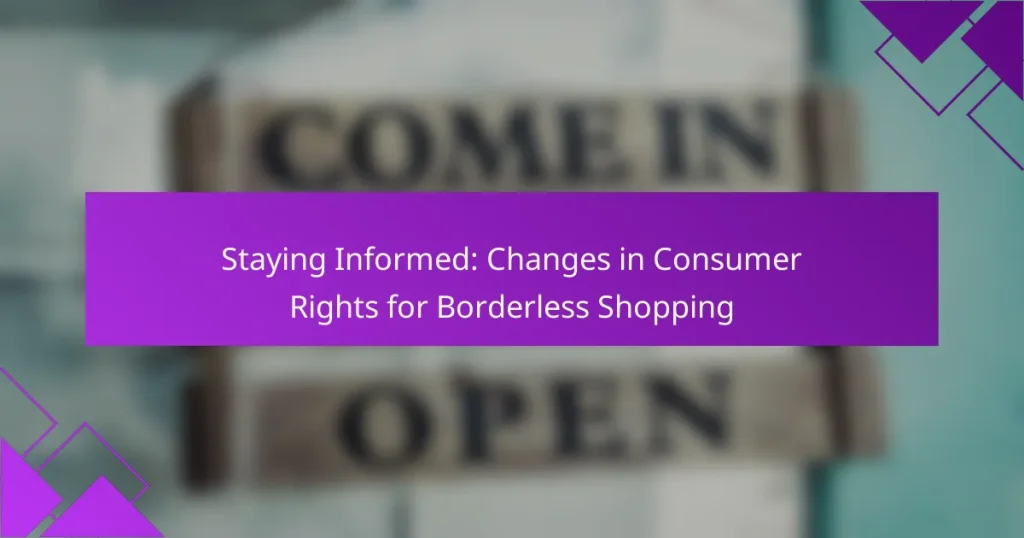As borderless shopping becomes increasingly popular, recent changes in consumer rights are designed to enhance protections for shoppers. Key updates include improved return policies, stronger data protection laws, and greater transparency in pricing, all aimed at ensuring safer transactions and reliable access to refunds. Understanding these regulations is essential for consumers to navigate customs duties and taxes effectively, leading to a smoother shopping experience across international borders.
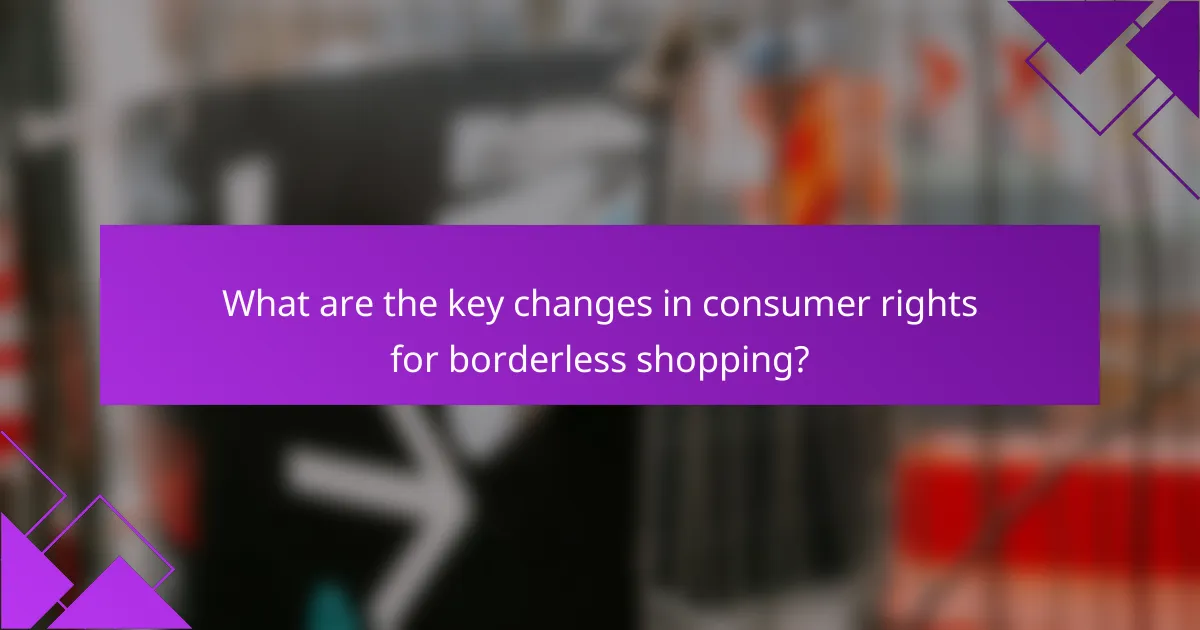
What are the key changes in consumer rights for borderless shopping?
Key changes in consumer rights for borderless shopping include enhanced return policies, stronger data protection laws, and increased transparency in pricing. These adjustments aim to provide consumers with better protection and clarity when purchasing goods from international sellers.
Enhanced return policies
Enhanced return policies allow consumers to return products purchased from foreign retailers more easily. Many countries now require sellers to offer a minimum return period, typically ranging from 14 to 30 days, during which customers can return items without hassle.
When shopping cross-border, it’s crucial to check the seller’s return policy before making a purchase. Look for details on who covers return shipping costs and whether refunds are issued in the original currency or converted to your local currency.
Stronger data protection laws
Stronger data protection laws have been implemented to safeguard consumer information when shopping online across borders. Regulations like the General Data Protection Regulation (GDPR) in Europe set strict guidelines on how businesses must handle personal data, ensuring that consumers’ privacy is respected.
Consumers should be aware of their rights regarding data usage. Always review privacy policies to understand how your information will be used and stored, and look for options to opt out of data sharing where applicable.
Increased transparency in pricing
Increased transparency in pricing means that consumers can expect clearer information about the total cost of their purchases, including shipping fees and potential customs duties. This change helps prevent unexpected charges at checkout or upon delivery.
When shopping internationally, always check the final price before completing your order. Look for breakdowns of costs, including taxes and fees, to avoid surprises. Many retailers now provide estimated duties at checkout, which can help you make informed purchasing decisions.

How do these changes impact consumers in the UK?
The recent changes in consumer rights for borderless shopping significantly enhance protections for UK consumers. These adjustments ensure that shoppers can enjoy safer transactions and more reliable access to refunds when purchasing from international retailers.
Improved purchase security
With the new regulations, UK consumers benefit from enhanced purchase security when shopping across borders. This includes stronger verification processes for online transactions, which help reduce the risk of fraud and unauthorized charges.
Consumers should look for merchants that comply with these updated security standards. Features such as secure payment gateways and buyer protection policies are now more common, providing peace of mind during online purchases.
Better access to refunds
The changes also streamline the refund process for UK consumers, making it easier to return items purchased from abroad. Retailers are now required to provide clear information on their return policies, including timelines and procedures for refunds.
When shopping internationally, consumers should always check the refund policy before completing a purchase. Understanding the terms can prevent complications and ensure that returning items is a straightforward process.
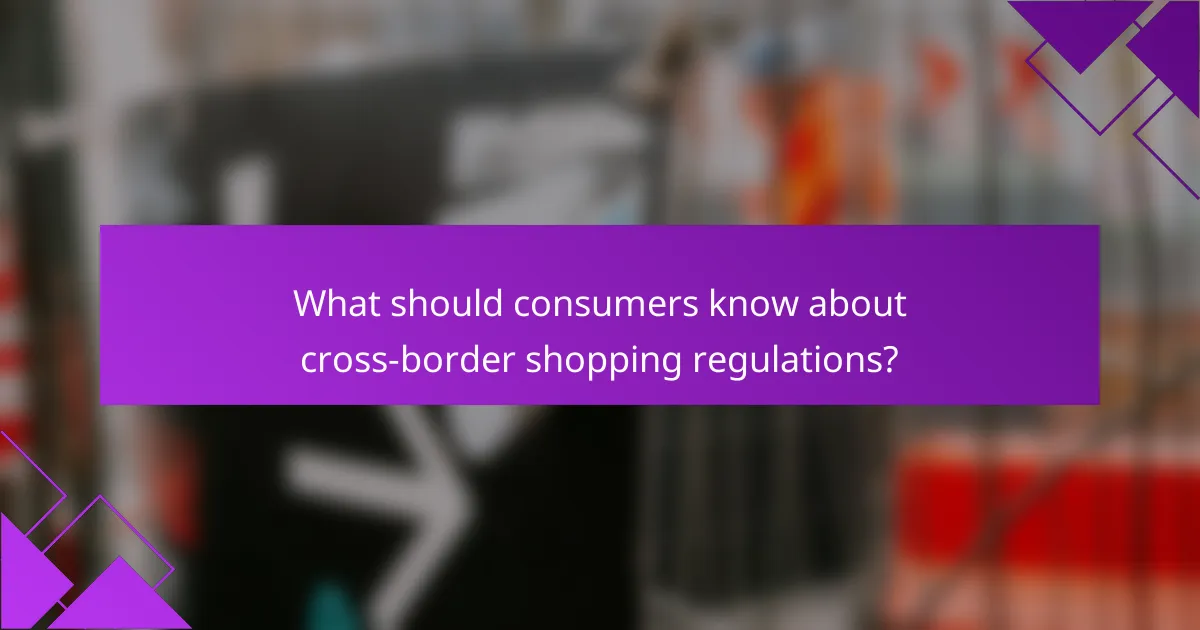
What should consumers know about cross-border shopping regulations?
Consumers engaging in cross-border shopping should be aware of regulations that govern customs duties, taxes, and consumer protection laws in different countries. Understanding these regulations can help avoid unexpected costs and ensure a smoother shopping experience.
Customs duties and taxes
When purchasing goods from another country, customs duties and taxes may apply. These charges vary by country and can significantly affect the total cost of your purchase. For example, in the European Union, customs duties can range from 0% to 20% depending on the product category.
Additionally, many countries require consumers to pay value-added tax (VAT) or sales tax on imported goods. In the United States, this can vary by state, with some states imposing no sales tax on certain items. Always check the specific regulations for your destination to avoid surprises.
Consumer protection laws by country
Consumer protection laws differ widely across countries, impacting returns, warranties, and dispute resolution. In the EU, for instance, consumers enjoy strong protections, including the right to return goods within 14 days for a full refund. In contrast, some countries may have more limited return policies.
Before making a purchase, familiarize yourself with the consumer rights in the seller’s country. This knowledge can help you navigate issues like defective products or unsatisfactory services. Consider checking resources like government websites or consumer advocacy groups for reliable information on these laws.

How can consumers protect their rights while shopping online?
Consumers can protect their rights while shopping online by understanding retailer policies and using secure payment methods. Being informed about these aspects helps ensure a safer and more reliable shopping experience.
Research retailer policies
Before making a purchase, it’s crucial to research the retailer’s policies regarding returns, refunds, and warranties. Many online retailers have different terms, and understanding these can help avoid unexpected issues later.
Look for clear information on the website about their return policy and customer service options. For instance, some retailers may offer free returns while others may charge a fee. Knowing these details can save you time and money.
Use secure payment methods
Using secure payment methods is essential for protecting your financial information while shopping online. Credit cards and reputable payment platforms often provide fraud protection and dispute resolution services, which can be beneficial if something goes wrong with your order.
Avoid using direct bank transfers or less-known payment methods that may not offer the same level of security. Always check for HTTPS in the website URL and look for security badges before entering payment details.

What are the best practices for ensuring a safe borderless shopping experience?
To ensure a safe borderless shopping experience, prioritize security and transparency. Familiarize yourself with the seller’s reputation, payment methods, and return policies to mitigate risks associated with international transactions.
Read reviews and ratings
Checking reviews and ratings is essential for assessing the reliability of an online retailer. Look for feedback on platforms like Trustpilot or Google Reviews, where customers share their experiences. Aim for sellers with a high percentage of positive reviews, ideally above 80%.
Pay attention to detailed reviews that mention product quality, shipping times, and customer service. If multiple reviews highlight similar issues, consider it a red flag before making a purchase.
Check for secure website indicators
Before entering personal or payment information, ensure the website is secure. Look for a URL that begins with “https://” rather than “http://”, as the ‘s’ indicates a secure connection. Additionally, check for a padlock icon in the address bar.
Be cautious of websites that do not display these indicators. Avoid entering sensitive information on sites that lack proper security measures, as this can lead to data breaches or fraud.
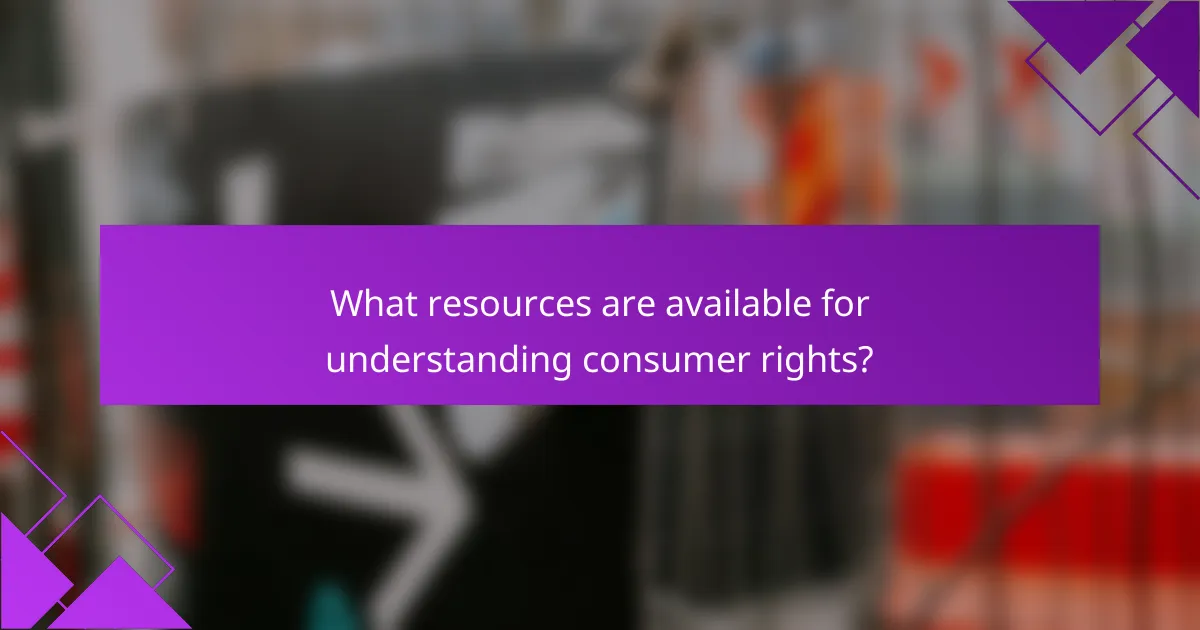
What resources are available for understanding consumer rights?
To navigate changes in consumer rights for borderless shopping, various resources are available. These include official government websites, consumer advocacy groups, and legal frameworks that outline rights and protections for consumers in cross-border transactions.
Consumer Rights Act 2015
The Consumer Rights Act 2015 is a key piece of legislation in the UK that consolidates consumer rights regarding goods and services. It ensures that products must be of satisfactory quality, fit for purpose, and as described, providing a strong foundation for consumer protection.
Under this act, consumers have the right to a refund, repair, or replacement if goods are faulty. This is particularly relevant for online purchases, including those made from overseas retailers, as it applies to all transactions conducted within the UK.
European Consumer Centre
The European Consumer Centre (ECC) provides valuable information and support for consumers engaging in cross-border shopping within the EU. It helps individuals understand their rights when purchasing goods or services from other EU countries.
Consumers can access resources such as guides on consumer rights, complaint procedures, and information on resolving disputes. The ECC also offers assistance in various languages, making it easier for shoppers to navigate their rights in different jurisdictions.
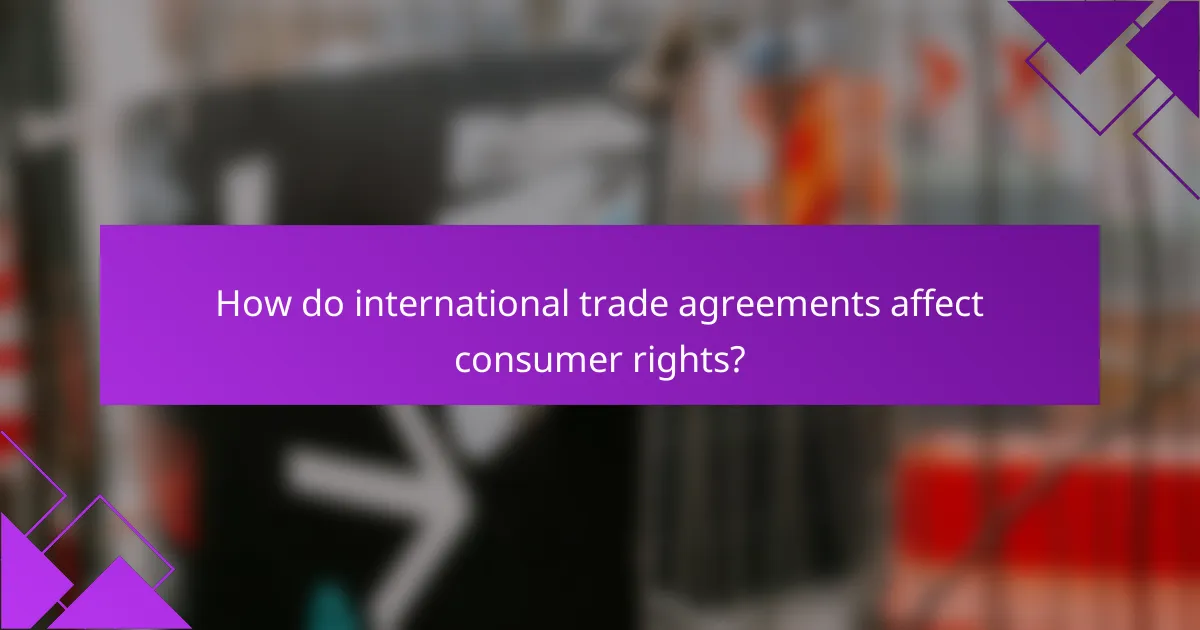
How do international trade agreements affect consumer rights?
International trade agreements play a significant role in shaping consumer rights by establishing rules that govern cross-border transactions. These agreements can enhance protections for consumers, but they may also limit certain rights in favor of trade facilitation.
Impact of the EU-UK Trade Agreement
The EU-UK Trade Agreement, effective since January 2021, has implications for consumer rights in both regions. It aims to maintain a level of consumer protection while allowing for smoother trade between the EU and the UK.
Consumers may benefit from continued access to goods and services without significant tariffs, but they should be aware that some regulatory differences may arise. For instance, UK consumers might find that certain EU consumer protections, such as product safety standards, are no longer automatically applicable.
Role of the World Trade Organization
The World Trade Organization (WTO) sets global trade rules that can influence consumer rights indirectly. By promoting fair trade practices and reducing trade barriers, the WTO helps ensure that consumers have access to a wider variety of goods at competitive prices.
However, the WTO’s agreements can sometimes prioritize trade efficiency over consumer protections. For example, some countries may feel pressured to lower their product safety standards to attract foreign investment, which could impact consumer safety. Consumers should stay informed about these dynamics to understand their rights in a global marketplace.
